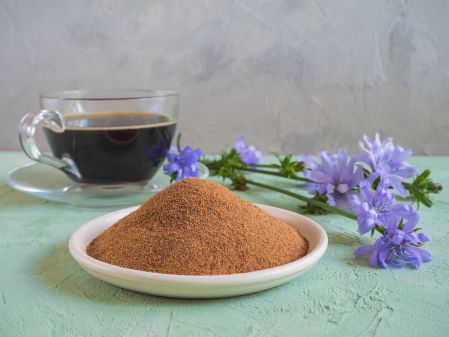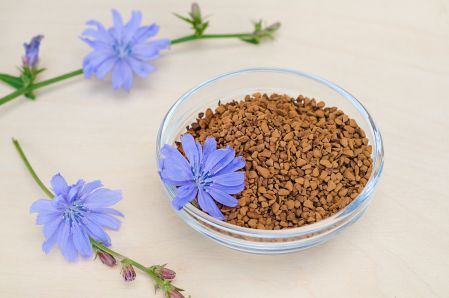Chicory is a perennial plant, which has been traditionally used for medicinal and culinary purposes. The root of the plant contains several bioactive compounds such as inulin, tannin, coumarins, sesquiterpene lactones, volatile oils, flavonoids, alkaloids and micronutrients, which are responsible for improving digestive health, cardiac health and metabolism.
Some information regarding chicory
- Chicory is a plant belongs to dandelion family
- Chicory roots are more nutritious
- It acts as food additives
- It is also utilized as substitute of coffee
- Extract of chicory root contains significant amount of fibre and extensively used for various therapeutic purposes
- Chicory extract also used as sweetener
Important products of chicory
Chicory coffee
- It is a well-known beverage made up of chicory root
- The root is roasted, brewed, ground and mixed with coffee
- It can also be consumed alone by mixing with hot water
- Consumption of such coffee is beneficial for those individuals who want to reduce caffeine intake and its consumption is also comparatively beneficial for diabetic patients
Steamed chicory

- It is generally prepared by using chicory leaves and roots which are subjected for steaming for 5 minutes approximately and then consumed
- It can be also consumed by adding with pasta and salads
- Consumption of steamed chicory is very beneficial for health. It helps to prevent the susceptibility of developing degenerative and infectious diseases
Chicory syrup
- It is prepared mainly by hydrating the fibre contents of chicory roots through enzymatic processes
- It is associated with improving bowel health, colonic motility, digestion and absorption of nutrients. It also helps to prevent constipation
- It does not contain sugar and provides fewer calories hence act as low glycemic food and beneficial for diabetic patient. It helps to decrease the insulin demand as well
- It also acts as a source of prebiotic
Grilled chicory
- It is prepared by chicory root
- The root is cut and coated with olive oil and allowed for grilling
- It can be consumed with lemon juice and it enhances the nutritive value of the lemon juice in many folds
Health benefits
Role on digestion
- Chicory helps to promote gut health. It has seen that chicory contains inulin, which is fructo-oligosaccharide (type of fibre), acts as prebiotic. It helps to feed beneficial microbes of the gut that helps to improve intestinal health and also promotes absorption of nutrients
- It also facilitates digestion by enhancing gastric juice secretion
- The fibre content of chicory is associated with improving bowel movement. It helps to increase the mass of the stool and helps to make the stool soft (as it helps to retain water within stool) that facilitates easy passage of stool and prevents constipation
- It is also associated with improving peristalsis hence helps to prevent the risk of colonic pouch formation and colon cancer

Role on hepatic health
- It helps to promote hepatic health by preventing oxidative damages of liver
- It also helps to prevent fatty infiltration of liver by reducing the concentration of cholesterol especially LDL within body and hence improves hepatic functionality
- It has seen that consumption of chicory seed extract with hot water helps to prevent nonalcoholic fatty liver disease
Role on skin
- Chicory helps in promoting skin barrier function
- It also helps to prevent dryness of skin
- It has seen that chicory root extract is beneficial for improving the health of skin collagen
- It is responsible for exerting a smoothing appearance of skin
- It helps to prevent wrinkles
- It is also related with preventing ageing
- Chicory root extract is very effective for preventing eczema
- It also has strong antifungal properties and shows significant effect against Candida species

Role on weight management
- Chicory plays significant role in weight reduction
- Fibre content of chicory helps to prevent obesity by increasing catabolism of the body
- It also helps to reduce cholesterol concentration, which is accountable for reducing obesity as it inhibits fat accumulation within body
- Inulin, the oligofructose of chicory is responsible for inhibiting ghrelin secretion (hunger hormone) that reduces appetite, resulting in lesser calorie intake
Anti-inflammatory activities
- Chicory root shows strong anti-inflammatory activities
- It helps to prevent various inflammatory events of body by inhibiting cytokines
- It helps to reduce pain and swelling of inflamed area
Anti-carcinogenic activities
- It has strong antioxidant activities that help to prevent the oxidative damages of the body hence reduce the prevalence of developing cancers
- Chicory root has anti-proliferative activities that help to suppress the growth of tumors and malignant cells
- It especially helps to reduce the susceptibility of skin cancers

Role on mental health
- It has sedation effects that help to reduce anxiety
- It is also associated with reducing stress and depression
- As it is used as a substitute of coffee hence it has some effects on mental health similar with coffee, such as it helps to boost up the mood, refreshes mind and prevents tiredness

Therapeutic usages
Chicory and diabetes mellitus
- It is used as an important therapeutic agent, which helps to prevent the early onset of diabetes mellitus
- It has seen that chicory is responsible for increasing the concentration of adiponectin within body. Adiponectin is a protein helps to regulate blood sugar level
- Inulin content of chicory root also plays significant role in reducing blood sugar concentration by decreasing intestinal glucose uptake and by facilitating proper carbohydrate metabolism
Chicory and cardiovascular disease
- Inulin content of chicory is responsible for reducing the concentration of LDL within body. Whereas helps to increase the level of HDL, hence helps to lessen the prevalence of atherosclerosis by inhibiting fat (LDL) deposition within blood vessels
- Chicory is rich in phenols, which have potent anti-thrombotic and anti-arrhythmic activities
- Anti-thrombotic effects help to prevent plaque formation within blood vessel and help to reduce the prevalence of coronary artery disease
- Anti-arrhythmic activities of chicory are associated with regulating heartbeat
- It also helps to prevent hypertension
Chicory and arthritis

- It is used as an effective preventive measure for arthritis
- It has seen that extract of chicory contains significant number of polyphenols that exert strong anti-inflammatory activities, which help to combat arthritis by preventing joint inflammation
- Chicory extract significantly helps to improve the symptoms of rheumatoid arthritis
Chicory and renal disabilities
- It helps to protect the kidney from injuries
- It has seen that it helps to reduce the concentration of uric acid and hence helps to prevent the prevalence of kidney disorders
- Chicory root extract has strong diuretic properties and helps to excrete toxins by enhancing urine volume as well as urination
- Individual who have renal problems should consult a physician or nutritionist before consuming chicory
General consideration of using chicory
- It should be avoided during pregnancy and lactation
- Individual allergic to ragweed or associated plant should avoid chicory
- It should not take in excessive amount as it may cause skin irritation

Source:
Jangra, S.S., 2018. Studies on phytochemicals, nutritional parameters and antioxidant potential of Chicory (Cichorium intybus L.) and Garden cress (Lepidium sativum L.) (Doctoral dissertation, CCSHAU).
Micka, A., Siepelmeyer, A., Holz, A., Theis, S. and Schön, C., 2017. Effect of consumption of chicory inulin on bowel function in healthy subjects with constipation: a randomized, double-blind, placebo-controlled trial. International journal of food sciences and nutrition, 68(1), pp.82-89.
Nowrouzi, P.S., Mazani, M., Rezagholizadeh, L. and Banaei, S., 2017. Mechanism and clinical aspects of the effects of chicory on diabetes. Asian Journal of Research in Medical and Pharmaceutical Sciences, pp.1-11.
Nwafor, I.C., Shale, K. and Achilonu, M.C., 2017. Chemical composition and nutritive benefits of chicory (Cichorium intybus) as an ideal complementary and/or alternative livestock feed supplement. The Scientific World Journal, 2017.
Reimer, R.A., Soto-Vaca, A., Nicolucci, A.C., Mayengbam, S., Park, H., Madsen, K.L., Menon, R. and Vaughan, E.E., 2020. Effect of chicory inulin-type fructan–containing snack bars on the human gut microbiota in low dietary fiber consumers in a randomized crossover trial. The American Journal of Clinical Nutrition, 111(6), pp.1286-1296.
Šaponjac, V.T., Kojić, J., Krulj, J., Moreno, D.A., García-Viguera, C., Bodroža-solarov, M. and Ilić, N., 2020. Chicory (Cichorium intybus L.) as a food ingredient–nutritional composition, bioactivity, safety, and health claims: A Review. Food Chemistry, p.127676.
Theis, S., 2018. Authorised EU health claim for chicory inulin. In Foods, Nutrients and Food Ingredients with Authorised EU Health Claims (pp. 147-158). Woodhead Publishing.
Thorat, B.S. and Raut, S.M., 2018. Chicory the supplementary medicinal herb for human diet. Journal of Medicinal Plants, 6(2), pp.49-52.



